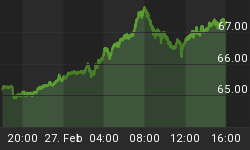"Every serious economist knows that rising oil prices contribute to rising inflation" or so think Thomas E. Nugent (NRO, Current Fed Policy Is Inflationary: Will our central bank throw more gas on the flames?, 7 June 2006). Now the economists that Mr Nugent knows may very well think that rising oil prices can cause or contribute to inflation: There are others, however, that take a more subtle view of the inflationary process.
Nugent's opinion is based on the commonplace observation that that the rising price of oil "finds its way into the prices of virtually all goods and services. My airline tickets now contain a fuel surcharge, as do my monthly gardener's bills and my limo fees to the airport". He cites as proof of -- to so many people -- this self-evident proposition the fact that in the 1970s surging inflation was accompanied by "OPEC-induced oil-price increases".
Every first-year economics undergraduate is taught that correlations are not the same as causal relationships. It is to be regretted that Mr Nugent, along with so many others, has forgotten that lesson. If Nugent and those who agree with him were correct about the 1970s inflation surge being caused by OPEC oil price hikes then the biggest oil importers should have suffered the highest inflation rates. They didn't.
For example, Japan and Germany are completely dependent on foreign oil producers yet after OPEC jacked up oil prices German inflation was only 7 per cent. But Japan's inflation rate leaped to 25 per cent while Australia's inflation rate rose to 17 per cent -- even though it was 75 per cent self-sufficient in oil. America's inflation rates was 12 per cent even though it imported 50 per cent of its oil. Great Britain's inflation rate was racing along at 25 per cent per annum even though she had become a significant oil producer thanks to the North Sea oil fields. Of particular interest is Saudi Arabia, the world's largest oil exporter, whose inflation rate at the time shot up to 35 per cent.
These figures clearly show that there was no real correlation between the price of imported oil and inflation. It turns out that those countries with the lowest rates of monetary growth enjoyed the lowest rates of inflation with the reverse being true. British rose to 24 per cent and the money supply ran at over 25 per cent. Japan's 25 per cent inflation was preceded by a 25 per cent monetary expansion.
Event today commentators fail to grasp that external price shocks like the 1973 oil hike are basically deflationary. Therefore the absurd claim that the Australian Reserve Bank caused stagflation because it was unable to distinguish between cost push and demand pull inflation reveals a staggering ignorance not only of the monetary facts of the time but also of advanced monetary theory and capital theory. The same criticism holds for US commentators.
Just for a moment let us assume that the world was on a gold standard when OPEC raised oil prices. The first effect would be a gold drain from oil-importing countries to OPEC followed by deflationary pressure as the money supply fell. At the same time OPEC countries would find their gold reserves rising followed by rising prices. Finding that their monetary incomes had risen citizens of OPEC countries would increase their demand for imports from the oil-importing countries.
(For the sake of simplicity I am assuming that their demand for imports would rise only after the gold inflow had caused domestic prices to rise. On the other hand, I believe that imports would actually rise before the rising gold stock made itself felt on the prices of local goods because incomes would exceed the demand to hold money).
Given that the demand for oil would be unresponsive to prices rises in the short run we can see that the effect of an OPEC-induced price rise would be to reduce consumption in oil-importing countries rather than raise prices. In short, the terms of trade move in favour of OPEC until the oil-importing countries find alternative oil supplies and substitutes while at the same time economising on the use of oil.
Therefore, oil price hikes are no more inflationary than a general wage rise. If unions succeeded in pushing up wage costs above the market level the effect is not rising prices but rising unemployment. This brings us to the fact that there are only two fundamental ways in which the direction of general prices can be altered: 1) through an increase in the money supply or 2) a reduction in the stock of goods. Number 1 is a money induced change in general prices and number 2 a goods-induced change.
This is why when a dirt-poor country is hit by famine causing food prices to rocket we never say that it is suffering from inflation generated by a sudden hike in food prices. It follows that if a country kept a constant money supply there would be a gentle decrease in prices if productivity were rising. This is precisely what happened in Great Britain from about 1874 to about 1896. As productivity rose faster than the gold supply the costs of production and consumer prices gradually declined.
Mr Nugent also asserted that raising "interest rates will contribute to, not mitigate, inflationary statistics". Nonsense. Interest is basically the price of time. In a free market it is a process by which the supply of capital goods are not only equated with the demand for their services but are also allocated through time so to speak. Forcing interest rates down below their market rates is the means by which the central bank expands credit and hence generates inflation. Raising them is its way of trying to correct its past monetary errors by curbing the money supply.















